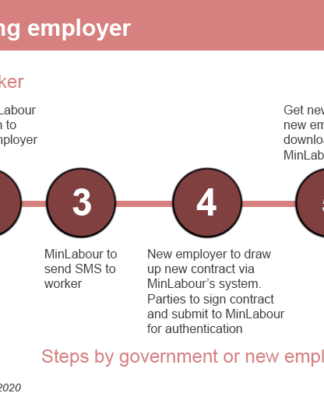Johnny Depp’s ex-wife Amber Heard was diagnosed with 2 personality disorders. What are the signs?
During the ongoing court case between the two actors, a psychologist hired by Depp’s team diagnosed Heard with both borderline personality disorder and histrionic personality disorder. How do these mental health conditions affect you if someone in your life has them, too?

Celebrity lawsuits often bring revealing details to the fore – case in point, the US$50 million (S$69 million) defamation case that actor Johnny Depp has filed against his ex-wife Amber Heard. The 58-year-old Pirates Of The Caribbean star is suing Heard, 36, for damages that her 2018 Washington Post op-ed has cost him.
Amidst the myriad evidence submitted so far – such as allegations of spousal and sexual abuse as well as domestic violence – a few psychological terms have also been thrown into the mix.
One of them is borderline personality disorder, which was brought up in court by witness Dr Shannon Curry, a psychologist in California and Hawaii hired by Depp’s team, in her evaluation of Heard. Dr Curry, who also evaluated that the Aquaman actress has histrionic personality disorder, reached the conclusion after examining the actress’ previous psychological evaluations, together with her own direct examination.

Just how, or if, these evaluations will have any bearing in the outcome of the case is for the lawyers to prove in court and the jury to decide. But what exactly are borderline personality disorder and histrionic personality disorder in the psychological sense? And how do you recognise the signs if you suspect a loved one could potentially have these personality disorders?
WHAT IS BORDERLINE PERSONALITY DISORDER (BPD)?
People with BPD often experience intense mood swings and feel uncertain about how they see themselves – and those emotions can lead to unstable relationships and poor self-image, said Dr Lim Boon Leng, a psychiatrist at Gleneagles Hospital’s Dr BL Lim Centre for Psychological Wellness.

If a loved one appears to experience the following signs, there is ground to suspect BPD, according to Dr Lim:
- Feelings of abandonment by friends and family that prompt frantic attempts to avoid being abandoned.
- A pattern of intense relationships with family, friends and loved ones that change rapidly from idealisation to devaluation.
- A distorted and unstable self-image.
- Impulsive behaviours such as spending sprees, unsafe sex, binge eating and reckless driving.
- Self-harm, suicide threats and suicide attempts.
- Periods of intense emotions like sadness, irritability and anxiety.
- Chronic feelings of emptiness.
- Intense anger followed by guilt.
- Feelings of dissociation such as observing oneself from outside one’s body.

HOW DO PEOPLE WITH BPD BEHAVE?
As much as BPD patients fear being abandoned by their loved ones, especially their partners, they ironically display behaviours that make people leave them, said Dr Lim, making relationships and jobs difficult to hold down for long. “They experience emotional swings easily and often fly into a rage with the mildest of slight.”
If you’re dating someone with BPD, he could be very nice and attentive to you at the beginning of the relationship, said Dr Lim. But a few months later, you might find him possessive and controlling. He might demean you, for instance, calling you a slut if you texted your male colleagues.
But he would as quickly be very nice to you and lavish you with gifts, said Dr Lim. And if that doesn’t work and you want to break up, he would threaten suicide. “He would be prone to depressive mood states and would have intense sadness a few times a week,” he added.
WHAT ABOUT HISTRIONIC PERSONALITY DISORDER (HPD)?
Like BPD, HPD is also marked by unstable emotions and a distorted self-image. The difference is, patients often behave dramatically or inappropriately to get attention, according to this study. “People with HPD typically present as flirtatious, seductive, charming, manipulative, impulsive and lively.”

If someone you know exhibits five or more of the following criteria, there is a chance HPD is at play, according to the US handbook, Diagnostic And Statistical Manual Of Mental Disorders, published by the American Psychiatric Association (APA):
- Uncomfortable when not the centre of attention.
- Shows seductive or provocative behaviour.
- Experiences shifting and shallow emotions.
- Uses appearance to draw attention.
- Uses impressionistic and vague speech.
- Dramatic or exaggerated emotions.
- Suggestible or is easily influenced by others.
- Considers relationships more intimate than they are.
HOW DO PEOPLE WITH HPD BEHAVE?
People with HPD are usually high-functioning, both socially and professionally. In fact, they tend to have good social skills although they are used to manipulate others into making them the centre of attention, according to the Cleveland Clinic.
While it is normal and universal for humans to want to be socially accepted, those with HPD may go a step further by faking things about themselves to reach their goals. A good example is the use of social media for social acceptance, noted this study.
“Individuals, who spend a lot of time on social media to make impressions of themselves in the minds of others, have been shown to display indications of histrionic personality,” the researchers noted.
“One of the features of histrionic personality is emotional shallowness, and individuals with histrionic tendencies may need more social approval than individuals who do not have histrionic tendencies.” Those attributes make those with HPD more vulnerable to social media addiction.
These individuals may also fail to see their situation realistically and instead, they tend to dramatise or exaggerate their difficulties. They tend to be easily bored, and crave novelty and excitement – all of which aren’t great news for their careers (they keep changing jobs) and mental health (they sink into depression when they do not get attention).

HOW COMMON ARE THESE PERSONALITY DISORDERS? WHO IS LIKELY TO DEVELOP THEM?
The exact causes of both personality disorders are unknown although experts believe they are the result of environmental and genetic factors.
“The actual data is not available,” said Dr Lim of BPD. “However, international studies indicate that about 1 per cent of the population has it.” Similarly, HPD is not commonly seen in clinical practice and its occurrence in Singapore isn’t tracked, said Dr Cornelia Chee, a senior consultant and the head of National University Hospital’s Department of Psychological Medicine.
Both personality disorders are said to be diagnosed more in women than men. “However, recent studies suggest that men and women are equally likely to suffer from BPD but men are often undiagnosed,” said Dr Lim. The same can be said of HPD, noted Healthline. “That may be because men report their symptoms less often than women.”
“BPD is usually only diagnosed in late adolescence and patients are most likely to seek psychiatric attention at around 17 to 18 years of age,” observed Dr Lim. “However, they may manifest symptoms as early as 12 years old.” As for HPD, it usually begins in the late teens or early 20s, according to Cleveland Clinic.

HOW ARE THESE PERSONALITY DISORDERS DIAGNOSED AND TREATED?
Personality disorders are often underdiagnosed, according to Dr Mark Zimmerman, the director of Outpatient Psychiatry and the Partial Hospital Program from Rhode Island Hospital. “When people with personality disorders seek treatment, their chief complaints are often of depression or anxiety rather than of the manifestations of their personality disorder,” he wrote in his study.
According to the APA, diagnoses are typically made in individuals above age 18 as the personalities of younger people are still developing.
The diagnosis is based on interviewing the patient, family members and loved ones about his symptoms, said Dr Lim. But this can be difficult as the personality disorder “often manifests itself during sessions and interviews”, he said. “For example, the patient may idealise the therapist and praise her. Yet, at the next session, the patient may devalue the therapist.”
He added: “There are instruments that can be utilised such as screening tests or structured interview questionnaires. These help with the diagnosis but cannot replace a careful psychiatric evaluation”.
As for the treatment, Dr Zimmerman noted that drugs are not very effective when it comes to personality disorders. But when it comes to treating other conditions that occur simultaneously such as depression or anxiety, medications are sometimes used, said Dr Lim.
The gold standard is psychotherapy, said Dr Lim. “There are many different techniques from psychodynamic psychotherapy to cognitive therapy and mindfulness therapy.”


































